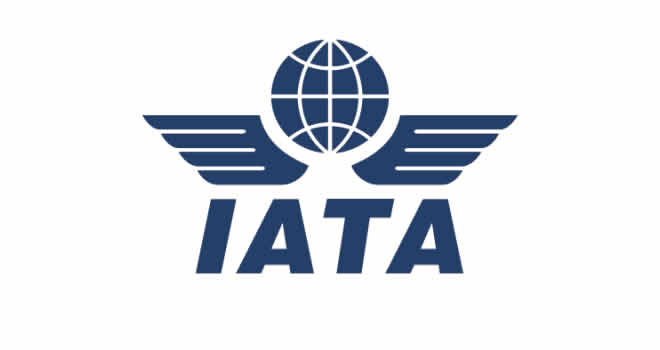Photo caption: IATA logo
Data on global air cargo markets has revealed that the African continent recorded the lowest cargo demand in March 2025, with a 13.4 per cent year-on-year decrease in demand.
The International Air Transport Association’s data released for March 2025 indicated that Nigerian airlines, as well as those on the African continent, recorded low cargo during the review month.
Figures from IATA, however, showed that capacity in the region increased by 10.5 per cent year-on-year.
Globally, total demand, measured in cargo tonne-kilometers, increased by 4.4 per cent compared to March 2024 levels (5.5 per cent for international operations.
Capacity, measured in available cargo tonne-kilometers, expanded by 4.3 per cent compared to March 2024.
IATA’s Director-General, Willie Walsh, said, “March cargo volumes were strong. This may be partly a front-loading of demand as some businesses tried to beat the well-telegraphed April 2, 2025, tariff announcement by the Trump administration.
“The uncertainty over how much of the April 2 proposals will be implemented may eventually weigh on trade. In the meantime, the lower fuel costs, which are also a result of the same uncertainty, are a short-term positive factor for air cargo. And, within the temporary pause on implementation, we hope that political leaders will be able to shift trade tensions to reliable agreements that can restore confidence in global supply chains.”
March volumes typically rise after a lull in February, and this single-digit increase is in line with pre-COVID growth trends.
The IATA document further showed that jet fuel prices dropped by 17.3 per cent year-on-year, marking nine straight months of year-on-year declines.
IATA suggested that the sharp rise in US tariffs and new trade rules, especially the May 2nd ban on duty-free imports from China and Hong Kong, may have prompted companies and buyers to purchase in advance to avoid significant import fees.
World industrial output also grew by 3.2 per cent year-on-year, and trade volumes expanded by 2.9 per cent.
Many key Consumer Price Inflation indices fell. “US inflation was 2.4 per cent, down 0.4 points from February, EU CPI was 2.5 per cent, and Japan’s rate fell 0.1 per cent to 3.6 per cent. China remains in deflation, but this eased to -0.1 per cent.”
The document further showed “that Asia-Pacific airlines saw 9.6 per cent year-on-year demand growth for air cargo in March, the strongest growth among the regions. Capacity increased by 11.3 per cent year-on-year. “
North American carriers also saw a 9.5 per cent year-on-year increase in demand growth for air cargo in March. Capacity increased by 6.1 per cent year-on-year.
European carriers saw a 4.5 per cent year-on-year increase in demand growth for air cargo in March. Capacity increased by 2.0 per cent year-on-year.
Middle Eastern carriers saw a -3.2 per cent year-on-year decrease in demand growth for air cargo in March. Capacity increased by 0.8 per cent year-on-year.
“It’s possible the weakness in this market is due to year-on-year comparison with the strong growth at the start of 2024, resulting from disruption to Red Sea maritime freight,” IATA suggested.
Latin American carriers also showed 5.8 per cent year-on-year demand growth for air cargo in March. Capacity increased 4.7 per cent year-on-year.



